Though Isabelle Wen's (溫慶珠) latest spring/summer offering on the weekend was her favored combination of feminine frills and sequins, there was an edge that had observers saying it was one of her best collections yet.
The "Twirling Sofi" show at the designer's restaurant/lounge bar in Taipei may have been inspired by sufism and the dance of the whirling dervishes that is said to represent a spiritual journey to perfection, but it had the fashionable advantage of being sexy too.
Transparent tops, chiffon and lace set off by golden threads and colored sequins were combined for a look that was fresh and lively, with nods to the 60s and counter culture. A model twirling round in a gossamer light mini skirt was a magical and powerful image that summed up the show.
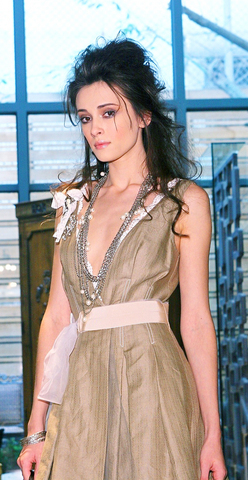
PHOTOS COURTESY OF ISABELLE WEN
And since this year is the 20th anniversary of the founding of her design company, the collection was an achievement that deserved all the applause it got. The Taipei fashionista has hit a high point in her career and the only problem is keeping up the momentum.
Wen has recently added a boutique to the number of stores that sell her clothes and has also successfully diversified, publishing a bimonthly style magazine, as well as opening Fifi restaurant, W lounge bar and the Japanese restaurant Bamboo. Her reputation is secure here and China beckons.
But behind success there is sometimes sadness. A brush with a life-threatening illness and overcoming a creative hiatus six years ago has made Wen more appreciative of life's blessings and drove her to reach greater heights. Even so, she said her public image was "a shell."
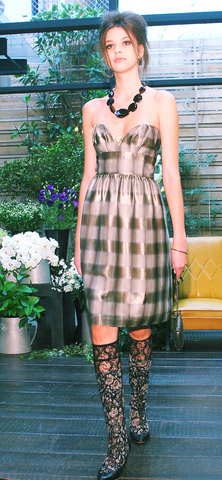
"Though I may be sick and tired it is my job to make people happy. I don't want them to see just the horrible side of life, it is my job to reveal beauty," Wen said in an interview on Tuesday at her studio and workshop in Shihlin. "Some people think I'm Superwoman, but you know that is just face."
Wen said her current collection was, to an extent, the result of overcoming problems. In fashion as in art, there is no gain without pain.
"I was listening to a midnight radio station called Ai Yue Diantai (
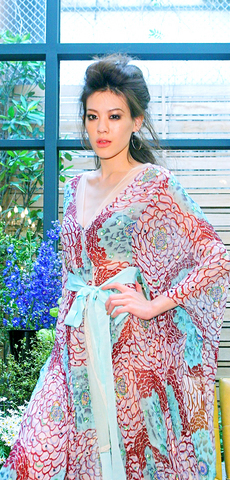
Like the dervish who attains a zen-like state, Wen said the music had helped her put "spiritual and material together" to come up with a concept for her show, "which is a way of letting fabric tell the story."
Wen's tale is an interesting one. Her father was a general in the Chinese Nationalist Party (KMT) and arrived with his wife on these shores in 1949. Wen was born in Taipei but spent time in Pingtung and Tainan, where her father later served as a police chief. It was her mother, however, who introduced the young Wen to the world of fashion.
"She was a real artist," Wen said. "She showed me around art galleries and introduced me to fashion. I remember going to the tailor with her around the age of five or six and I would tell them what I wanted."
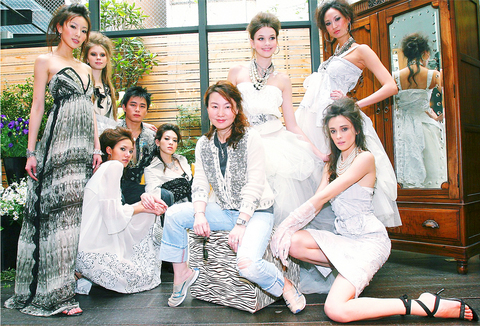
"First I dressed myself and others for my parents' parties; then I did the same for my friends' parties. Now it's my party. I have always done this. I have always followed my heart."
It was clearly a reasonably privileged upbringing. Her older sister Lily Wen (
"I didn't want to follow in anyone else's footsteps, I wanted to create my own life. ... As women we hide our true character until we die. If we do not then our men will not stay with us."
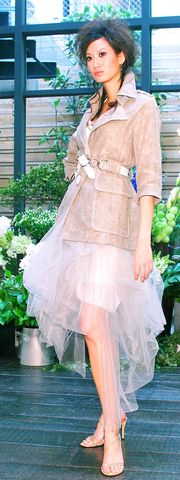
Though she attended Tanshui's Oxford College and did a course in tourism, her heart was in painting and she was the pupil of renowned painter O How-nien (
When her father died and her mother and older siblings emigrated to the US, "Fifi" as she was nicknamed, stayed in Taiwan and dressed the windows of a department store. She was then given some money in 1986 to start her own business in Dihua Street.
The fabric market in this area was the heart of Taiwan's rag trade at the time and Wen's progress mirrors that of Taiwan's fashion industry as a whole.
"When I started no-one bought local designs, everything was imported from Hong Kong, Europe and the United States. We knew nothing. This was the first stage. Now we have a lot of knowledge, but little understanding. This is the second stage."
The third step, according to Wen, is the relative maturity of Western fashion markets and successful branding.
"But I tell you, Beijing, Shanghai, these places will be as good as and better than New York and Milan. I guarantee you, in 10 years time, this is where the world will be looking."
Wen is also looking to China. But first, she says, "I want the world to know that Taiwan has great design."

The primaries for this year’s nine-in-one local elections in November began early in this election cycle, starting last autumn. The local press has been full of tales of intrigue, betrayal, infighting and drama going back to the summer of 2024. This is not widely covered in the English-language press, and the nine-in-one elections are not well understood. The nine-in-one elections refer to the nine levels of local governments that go to the ballot, from the neighborhood and village borough chief level on up to the city mayor and county commissioner level. The main focus is on the 22 special municipality

The People’s Republic of China (PRC) invaded Vietnam in 1979, following a year of increasingly tense relations between the two states. Beijing viewed Vietnam’s close relations with Soviet Russia as a threat. One of the pretexts it used was the alleged mistreatment of the ethnic Chinese in Vietnam. Tension between the ethnic Chinese and governments in Vietnam had been ongoing for decades. The French used to play off the Vietnamese against the Chinese as a divide-and-rule strategy. The Saigon government in 1956 compelled all Vietnam-born Chinese to adopt Vietnamese citizenship. It also banned them from 11 trades they had previously

Hsu Pu-liao (許不了) never lived to see the premiere of his most successful film, The Clown and the Swan (小丑與天鵝, 1985). The movie, which starred Hsu, the “Taiwanese Charlie Chaplin,” outgrossed Jackie Chan’s Heart of Dragon (龍的心), earning NT$9.2 million at the local box office. Forty years after its premiere, the film has become the Taiwan Film and Audiovisual Institute’s (TFAI) 100th restoration. “It is the only one of Hsu’s films whose original negative survived,” says director Kevin Chu (朱延平), one of Taiwan’s most commercially successful

Jan. 12 to Jan. 18 At the start of an Indigenous heritage tour of Beitou District (北投) in Taipei, I was handed a sheet of paper titled Ritual Song for the Various Peoples of Tamsui (淡水各社祭祀歌). The lyrics were in Chinese with no literal meaning, accompanied by romanized pronunciation that sounded closer to Hoklo (commonly known as Taiwanese) than any Indigenous language. The translation explained that the song offered food and drink to one’s ancestors and wished for a bountiful harvest and deer hunting season. The program moved through sites related to the Ketagalan, a collective term for the